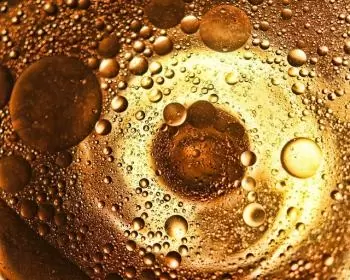
Density is an intensive quantity of matter in physics and chemistry that expresses how much mass of that material is present in a given volume. This physical property of matter is indicated by the Greek letter ρ.
To calculate the density, this formula is used:
Where,
-
m is the mass
-
V is the volume
In the SI system, density is expressed in kilograms per cubic meter (kg/m3), but the older unit (of the cgs system) grams per cubic centimeter (g/cm3) or kilograms per cubic decimeter is also used.
To calculate the volume of an object, you can use the immersion bath made by Archimedes. It involves submerging the object in a container with a section that has an easy-to-calculate area and multiplying the area by the difference in height of the water surface.
The density of distilled water at a pressure of 1 atm and a temperature of 4 °C is 1000 kilogram per cubic meter (kg/m³), that is, 1 kg per liter.
How do pressure and temperature affect density?
The density of a substance is usually tabulated at a given temperature and pressure because it depends on the size of these intensive quantities.
For most substances, the volume increases linearly with increasing temperature. This temperature dependence of density is expressed in the expansion coefficient of a substance.
 Water, among others, is an exception to this rule. Especially at lower temperatures, the expansion coefficient of water shows a deviated behavior: around 4 °C the expansion coefficient of water has a minimum.
Water, among others, is an exception to this rule. Especially at lower temperatures, the expansion coefficient of water shows a deviated behavior: around 4 °C the expansion coefficient of water has a minimum.
The mass-to-volume ratio of a substance generally increases linearly at higher hydrostatic pressures. This compressibility is expressed in the compression modulus. The compression modulus is closely related to the elasticity of a material, which is expressed in the elastic modulus.
How does density vary between gases, liquids and solids?
The density of a substance differs depending on the state of aggregation under standard conditions. In general, the density of a substance in the solid phase is greater than in the liquid phase.
On the other hand, that of gases is much lower than that of liquids and solids under standard conditions.
Gases
A gas generally behaves like an ideal gas unless the pressure is very high or the temperature is far below the critical temperature of the gas. For an ideal gas, the density can be calculated using the following formula:
where:
-
M is the molar mass.
-
P is the pressure.
-
R is the gas constant.
-
T is the absolute temperature.
Liquids and solids
Solids with an open crystalline structure have a relatively low density than solids with a dense crystalline structure, such as metals and alloys.
When melting, the order of the crystalline structure of the solid is lost and the crystal bonds are broken. As a result, the average distance between atoms or molecules increases so that most substances expand during fusion. Therefore, the density of a substance usually decreases during fusion.
Types of densities
There are three different forms of density: absolute, relative and apparent. Each of these densities has its own specific purpose and application, and together they offer a more complete view of how materials and substances relate to their mass and volume.
Absolute density
Absolute density is the same concept as mass density (ρ). It represents the amount of mass (m) contained in a given volume (V) and is measured in units of mass per unit volume, such as kilograms per cubic meter (kg/m³).
It is the standard density used in most physical and scientific applications.
Relative density
Relative density, also known as specific gravity, refers to the ratio of the density of a substance to that of water (at a specific temperature and pressure).
Since water is taken as a reference, the relative density has no units and is expressed as a dimensionless number. If the relative density is less than 1, it means that the substance is less dense than water, and if it is greater than 1, it is more dense.
Apparent density
Bulk density is used in the context of granular materials, such as particulate solids or mixtures. It refers to the total mass of a system divided by its total volume, including both the solid particles and the empty spaces between them.
The apparent density is usually lower than the actual density of individual solids due to the presence of porosity and void spaces.
Examples of densities
Below I attach a table with examples of different substances and their densities:
|
Substance |
Density (g/cm³) |
Description |
|
Water (at 25°C) |
1.00 |
Water is a common substance, essential for life. |
|
Iron |
7.87 |
Iron is a dense metal used in industry and construction. |
|
Gold |
19.32 |
Gold is a precious metal known for its high value and brilliance. |
|
Lead |
11.34 |
Lead is a heavy metal that is used in various applications, such as batteries. |
|
Air (at 0°C and 1 atm) |
0.001225 |
Air is a mixture of gases that surrounds the Earth. |
|
Aluminum |
2.70 |
Aluminum is a light metal and widely used in industry and construction. |
|
Oak wood) |
0.75 - 0.95 |
Wood is an organic material used in construction and furniture manufacturing. |
|
Helium (at 0°C and 1 atm) |
0.0001785 |
Helium is a light gas used in balloons and cryogenic applications. |
|
Diamond |
3.51 |
Diamond is a crystalline form of carbon and is one of the hardest substances known. |
|
Mercury |
13.53 |
Mercury is a liquid metal at room temperature, used in thermometers and measuring devices. |
| Olive oil | 0.92 - 0.92 | Olive oil is a natural liquid widely used in cooking and gastronomy. |
Materials used as nuclear fuel
Below I attach the density of materials directly related to nuclear energy. These materials are essential in various applications in the nuclear industry and the generation of electrical energy in nuclear power plants.
These values may vary depending on the shape and condition of the material, so these are approximate values.
|
Substance |
Density (g/cm³) |
Description |
|
19.05 |
Uranium is a heavy metal that is used as fuel in nuclear reactors to generate energy. |
|
|
19.86 |
Plutonium is another material used as fuel in nuclear reactors and nuclear weapons. |
|
|
Depleted uranium |
19.1 |
Depleted uranium is uranium that has a reduced concentration of the fissile isotope U-235 and is used in military and civilian applications. |
|
Tritium |
0.08 |
Tritium is a radioactive isotope of hydrogen used in nuclear fusion energy production and lighting devices. |